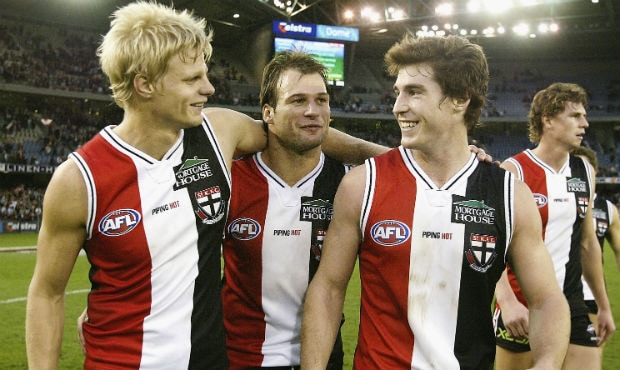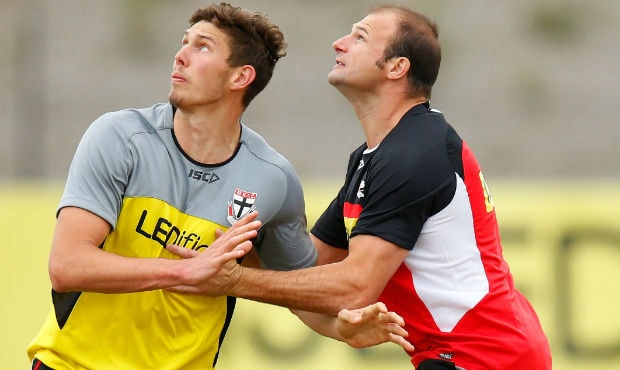Born August 20, 1977
190 games, 239 goals
184cm
91kg
Hamill grew up in the ACT suburb of Tuggeranong and as a youngster concentrated mainly on rugby union, rugby league and basketball. By the time he was chosen for representative basketball teams he had to choose between that sport and football and opted for footy. In his last year in the ACT he played 15 games in the Tuggeranong senior side under the coaching of former St Kilda great "Cowboy" Neale.
His strength at the contest and powerful work ethic help set the tone for his team. Always the first on the training track and the last to leave, his professionalism set the bar for those around him. He was selected as captain of the Saints for 2003 as the first in a controversial rotation scheme. His fierce attack on the ball made him a fine leader and he was also an off-field mentor to young stars Riewoldt, Ball and Koschitzke, he would often pick up Brendon Goddard from school to give him a lift to training and then drop him back there. He had a solid 2004, but injured a knee late in the year and missed the finals.
Over the course of the next two years the succession of injuries to his foot then his knee cast grave doubts over whether his battering ram style would prematurely end his career. The sight of the valiant Hamill stumping around on one leg in the 2006 elimination final was a sorry one. He did not play a game in 2007 and retired at the end of the season.
What were your favourite memories of playing with the Saints and Carlton?
I was with Carlton for six years, so I guess I was just fortunate enough to play with some incredible characters and talented players. I got drafted to a good club with some AFL legends which held me in good stead for the rest of my career.
How did you get from the Saints to Carlton?
It was in 2000 just in the trade period, it was an interesting time. Once I arrived I’d heard a lot about Harvey, Loewe, Burke, Thompson, great players of this football club so it was fantastic to learn. That year Nick Riewoldt and Justin Koschitzke were draft picks one and two, so there were seven or eight players that arrived at the same time with Fraser Gehrig and Steve Lawrence. It was Malcom Blight’s first year and I enjoyed seeing what he had to offer and how he coached. I’d heard a lot about his legacy so it was good to see how he went about it.
How did Grant Thomas and Malcolm Blight’s coaching styles differ?
I guess every coach has their own different styles. Malcolm was good tactically. Grant was big on character and effort within the playing group - he was really good for the football club. We had a couple if good years and got to two preliminary finals in a row. While ultimately we didn’t get the main prize we did have a fair bit of success under Grant Thomas.
WHERE ARE THEY NOW? Stewart Loewe
How did you develop as a player from the beginning to the end of your career?
There’s a lot of difference tactically wise in the game of footy, but ultimately you’ve got to win your own footy, use the ball, and play your role for the team. You’ve got to be prepared to pay the price in every game of footy and if you’re not, then you get what you get. It’s as simple as that.
You get what you give, that’s basically what I learnt at a young age. Fluking does not win games – they are won by planning and preparation. You’ve got to know your role and have to execute it consistently.
You have to be able to play defence and if you can’t play defence you can’t play AFL, which is what I preach to the players now.

Riewoldt, Hamill and Hayes leave the field after a win in 2004.
Were you always a strong body in forward, or were you a midfielder or defender other times?
I was really lucky, when I first started at Carlton I played down back which was under Stephen Silvagni, Michael Sexton, Peter Dean, Mill Hanna and Dean Rice. Back then I was really lucky to learn under those guys. I started down back and probably played a year down there and then played my role up forward for the rest of my career.
WHERE ARE THEY NOW? Xavier Clarke
Which players impressed you when you first arrived at St Kilda?
Robert Harvey and Andrew Thompson certainly set an example early days. I really enjoyed working hard with them because they were pretty keen to be successful. The young crew coming in were also really good because they embraced the work and jumped on board.
What have you been up to since you retired?
I’m involved with a construction company with Hamill Pools. That’s going okay and gives me a fair bit outside of footy. The business is going well but I can’t put as much time into it anymore because I’m a full-time assistant coach.
Was coaching always something you wanted to get back into?
I enjoy working with the younger crew. You see how it’s completely different from playing with what happens off the field coaching-wise. It’s certainly rewarding and really enjoyable. I’m really happy doing what I’m doing now.
How do you find coaching Nick Riewoldt after being his teammate?
Nick’s the sort of guy that enjoys challenges so he would be disappointed if I didn’t challenge him. He’s such a good resource to have, particularly for our young forwards. We bounce a lot off each other and try to find the right formula each week. Sometimes you’re mad not to look within your resources inside your own footy club and as a coach I try to manage things and keep us accountable for what we want to achieve - week in, week out.
WHERE ARE THEY NOW? Lindsay Fox
Do you have any aspirations to be a senior coach one day?
I’m pretty happy doing what I’m doing now so I’ll see where it takes me. Every week I’m still learning about certain aspects of the game. Richo’s fantastic because he throws certain things at you and delegates really well.

Aaron Hamill coaches Tom Hickey in 2014.
What are your thoughts on modern day football?
If you can’t run, kick and defend you can’t play. That aspect is emphasised now more than ever. If you can’t maintain possession and use the ball, you leave yourself pretty vulnerable.
Do you still enjoy watching the game?
I still watch as much footy as I can and pay particularly close attention to the forwards. I try to take bits and pieces from every game I watch.
What does St Kilda mean to you?
I’ve met some great people here and formed some fantastic friendships. I was captain of the club which was a huge honour.
I’m glad I played a part at this footy club and was able to wear the jumper. Now I’m focused on bringing the next generation through so the club can achieve the ultimate success again. I don’t take my involvement for granted and love coming into work everyday.


